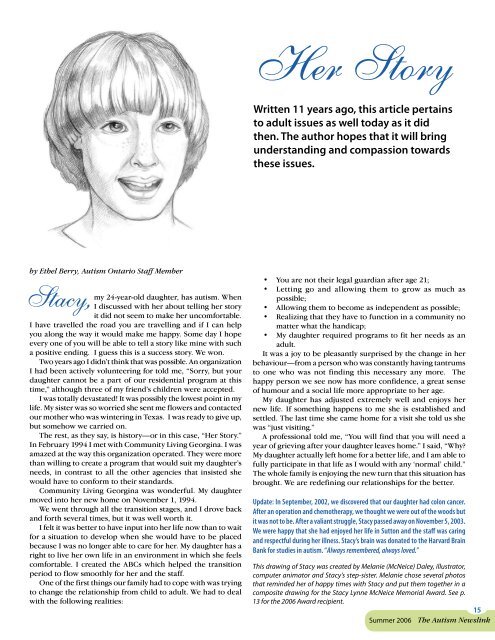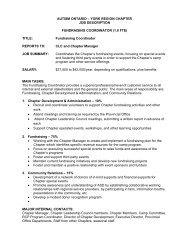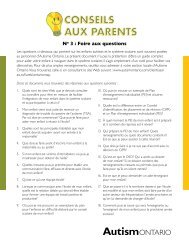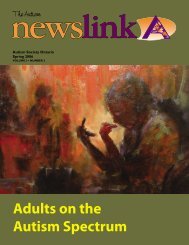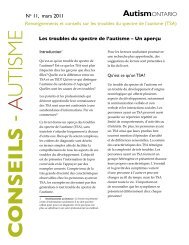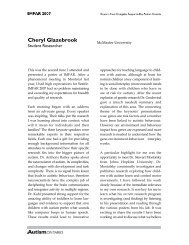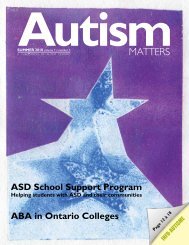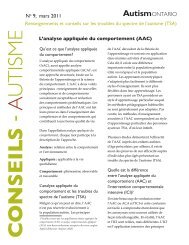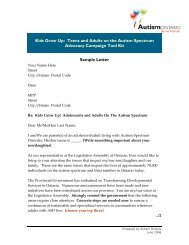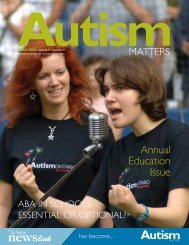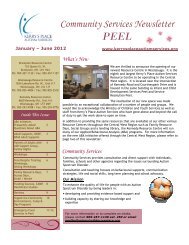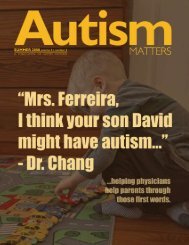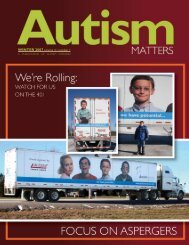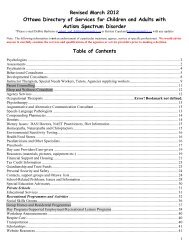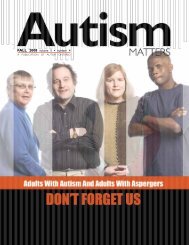Summer - Autism Ontario
Summer - Autism Ontario
Summer - Autism Ontario
Create successful ePaper yourself
Turn your PDF publications into a flip-book with our unique Google optimized e-Paper software.
Her StoryWritten 11 years ago, this article pertainsto adult issues as well today as it didthen. The author hopes that it will bringunderstanding and compassion towardsthese issues.by Ethel Berry, <strong>Autism</strong> <strong>Ontario</strong> Staff MemberStacy,my 24-year-old daughter, has autism. WhenI discussed with her about telling her storyit did not seem to make her uncomfortable.I have travelled the road you are travelling and if I can helpyou along the way it would make me happy. Some day I hopeevery one of you will be able to tell a story like mine with sucha positive ending. I guess this is a success story. We won.Two years ago I didn’t think that was possible. An organizationI had been actively volunteering for told me, “Sorry, but yourdaughter cannot be a part of our residential program at thistime,” although three of my friend’s children were accepted.I was totally devastated! It was possibly the lowest point in mylife. My sister was so worried she sent me flowers and contactedour mother who was wintering in Texas. I was ready to give up,but somehow we carried on.The rest, as they say, is history—or in this case, “Her Story.”In February 1994 I met with Community Living Georgina. I wasamazed at the way this organization operated. They were morethan willing to create a program that would suit my daughter’sneeds, in contrast to all the other agencies that insisted shewould have to conform to their standards.Community Living Georgina was wonderful. My daughtermoved into her new home on November 1, 1994.We went through all the transition stages, and I drove backand forth several times, but it was well worth it.I felt it was better to have input into her life now than to waitfor a situation to develop when she would have to be placedbecause I was no longer able to care for her. My daughter has aright to live her own life in an environment in which she feelscomfortable. I created the ABCs which helped the transitionperiod to flow smoothly for her and the staff.One of the first things our family had to cope with was tryingto change the relationship from child to adult. We had to dealwith the following realities:• You are not their legal guardian after age 21;• Letting go and allowing them to grow as much aspossible;• Allowing them to become as independent as possible;• Realizing that they have to function in a community nomatter what the handicap;• My daughter required programs to fit her needs as anadult.It was a joy to be pleasantly surprised by the change in herbehaviour—from a person who was constantly having tantrumsto one who was not finding this necessary any more. Thehappy person we see now has more confidence, a great senseof humour and a social life more appropriate to her age.My daughter has adjusted extremely well and enjoys hernew life. If something happens to me she is established andsettled. The last time she came home for a visit she told us shewas “just visiting.”A professional told me, “You will find that you will need ayear of grieving after your daughter leaves home.” I said, “Why?My daughter actually left home for a better life, and I am able tofully participate in that life as I would with any ‘normal’ child.”The whole family is enjoying the new turn that this situation hasbrought. We are redefining our relationships for the better.Update: In September, 2002, we discovered that our daughter had colon cancer.After an operation and chemotherapy, we thought we were out of the woods butit was not to be. After a valiant struggle, Stacy passed away on November 5, 2003.We were happy that she had enjoyed her life in Sutton and the staff was caringand respectful during her illness. Stacy’s brain was donated to the Harvard BrainBank for studies in autism. “Always remembered, always loved.”This drawing of Stacy was created by Melanie (McNeice) Daley, illustrator,computer animator and Stacy’s step-sister. Melanie chose several photosthat reminded her of happy times with Stacy and put them together in acomposite drawing for the Stacy Lynne McNeice Memorial Award. See p.13 for the 2006 Award recipient.15<strong>Summer</strong> 2006 The <strong>Autism</strong> Newslink


